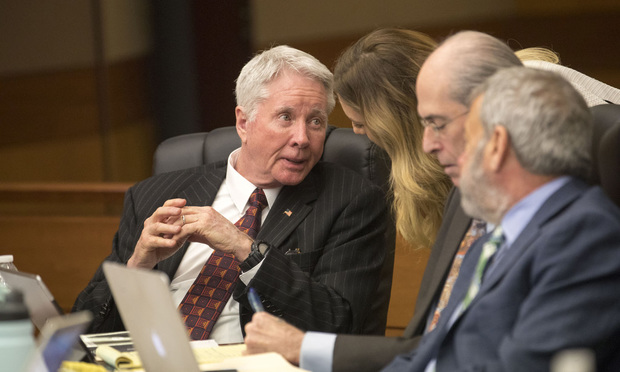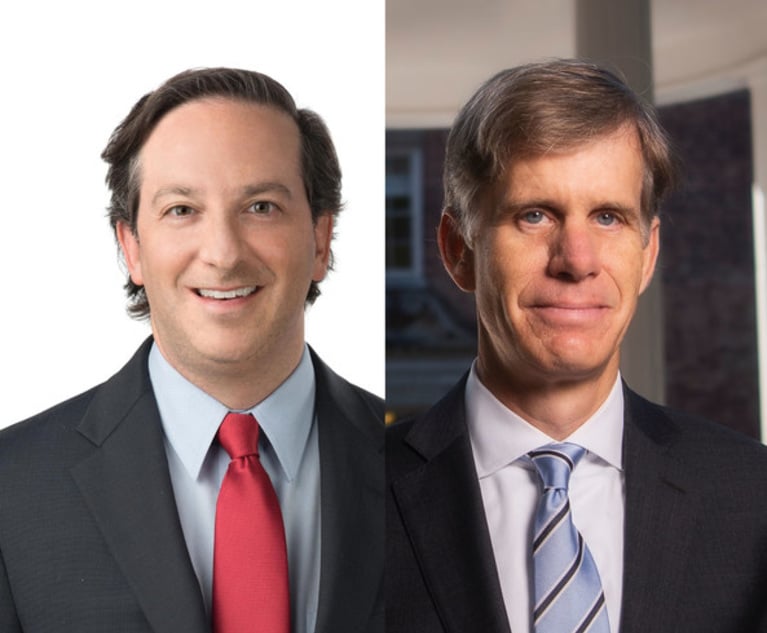Tex McIver Changed Will to Make Godson a Beneficiary After Shooting His Wife
The ex-wife of a Fulton County Superior Court judge, and Diane McIver's boss and mentor, said she adored the judge's son, who was her godson.
March 26, 2018 at 04:01 PM
7 minute read

Shooting victim Diane McIver loved godson Austin Schwall so much that she told his mother that when she died, that she wanted the boy to have the 75-acre ranch near Lake Oconee she owned with her husband, Claud “Tex” McIver.
After Tex McIver, an Atlanta attorney who was then a partner at Fisher & Phillips, fatally shot his wife, McIver told Anne Schwall that Austin, who was 10 when Diane McIver died, was not a beneficiary of her will.
“He told me that his biggest regret was that they did not get the chance … to update their wills,” testified Schwall, the ex-wife of Fulton County Superior Court Judge Craig Schwall. “He said that the wills were made before Austin was born.”

Within five weeks, as McIver became the subject of a criminal investigation into what he has always insisted was the accidental shooting of his wife, McIver changed his own will to make Austin a beneficiary, Anne Schwall testified Monday during the third week of testimony. Schwall said the new will was dated Oct. 19, 2016.
Prosecutors claim McIver had a financial motivation to kill his wife after he lost his equity partnership at Atlanta's Fisher Phillips in 2014.
Schwall said McIver told her he knew his wife wanted Austin to inherit their estates but “that they didn't get around to it. And that he wanted to make it right by her and that she wouldn't let him into heaven if he didn't update the will.”
Schwall said she asked McIver for a copy of the new will, which she gave to Fulton County prosecutors at their request just as jury selection began. Schwall said she was named as McIver's successor executor, who serves as an alternate if the appointed executor fails or refuses to act.
The new will left to McIver's youngest son, Robert McIver, a $500,000 bequest from proceeds of a $750,000 life insurance policy he carried, according to Schwall's testimony as she read from the will. McIver left nothing to his other two adult children.
He also left the entirety of his “residuary estate” to Austin and to Austin's children if he died before McIver. The residuary estate is what remains after all gifts, bequests and claims on the estate are satisfied.
That, according to McIver's defense attorney, Bruce Harvey, also included a trust that would provide for Austin's education, health support and maintenance.
Prosecutors claimed in opening statements and in pretrial hearings and pleadings that Diane McIver did update her will to make Austin her main beneficiary rather than her husband, whom she named as executor of her estate in a 2006 will made shortly after the couple married in 2005.
They also contend that McIver owed his wife more than $350,000 when he shot her and that he used his share of the couple's ranch as collateral. The only way that Diane McIver could ensure that the ranch was left exclusively to Austin, prosecutors have contended, was to foreclose on her husband, who had renewed the loan at least once and had only made interest payments.
Both Anne Schwall and Billy Corey—the chairman of U.S. Enterprises and Diane McIver's longtime employer, mentor and friend—testified about the close relationship Diane McIver had with Austin, who called her “Mama Di” or “Mommy Di.”
Corey said he has known Austin “since he was 5 weeks old.”
“She was obsessed with Austin. She worshipped Austin,” Corey recalled of the woman who was president of his billboard and real estate conglomerate when she died.
“I can't think of anything she didn't do for him,” Corey said. “If Tex and I were in intensive care, and Austin needed some toothpaste, she wouldn't think a thing about leaving us. … She would take care of Austin.”
Corey said that Diane McIver paid “for one of those high-class nurseries over in Buckhead” and that McIver frequently picked her godson up from school. As he got older, the boy would often call his godmother.
“She would drop everything to talk to Austin,” Corey recalled.
Corey also said that McIver “bought everything” Austin owned, including clothes and toys. He had a room in the McIvers' condominium and one at the ranch. Corey said the child was so close to Diane that he often slept in the couple's bedroom.
“Everything was Austin when his mother would let him go,” Corey testified. “Diane would drop everything any time she could take Austin to the ranch. He had been going all his life.”
Anne Schwall said she met the McIvers shortly after she married Craig Schwall. After Austin's birth, the Schwalls asked the McIvers to be Austin's godparents.
“They spent holidays with us. They spent every Christmas with us,” Schwall said. “They would go trick-or-treating with us. … They would go on family vacations in the summertime with us. She never missed a baseball game or a basketball game.”
Her son, she said, adored Diane. “She poured so much love into him, and he did the same. … It was just as if they were more liked grandparents than godparents.”
But Harvey pointed out for the defense that, “It wasn't just Diane” who Austin loved. “Austin loved Tex. He worshipped him. He wanted to see him all the time. He wanted to spend time with him.”
“He does,” Schwall replied.
But before he shot his wife, Tex and Diane McIver wrangled for at least five years over the terms of new wills they were negotiating with Atlanta estate planning attorney Harold Hudson.
In those discussions—which began in 2009 and lasted at least through 2014—Diane McIver was represented by Ken Rickert, general counsel of U.S. Enterprises Inc., Hudson said.
Hudson said the couple disagreed over ownership of the ranch should one of them die first. At the time, they had a joint tenancy with right of survivorship where, if one died, the other became sole owner. But Tex McIver wanted to convert the property ownership to a limited liability corporation that would alter the right of survivorship.
In a testy email to her husband in 2011 over a meeting he scheduled with Hudson, Diane McIver wrote, “I am not going to leave my half of the ranch to your estate.” Meeting with a lawyer until they resolved the dispute, she said, would be “throwing your money away.”
Hudson said he drew up codicils for both Tex and Diane McIver that would have amended their wills. He said that, while Tex McIver executed his codicil giving his wife all of his interest in the farm, fixtures and livestock as well as McIver Enterprises—the limited liability company he created—there was no provision for Austin Schwall.
Hudson said Diane McIver never executed the codicil, although he sent the proposed language to her and Rickert. But Rachel Styles, a close friend of the McIvers who worked for Diane McIver from 2011-2016 at U.S. Enterprises, testified that Diane McIver had asked her to make two copies of a document that McIver identified as her “new will.”
Styles said she didn't read the document. But, she said, “I knew she loved Austin. Austin wasn't born when she did her initial will. I just thought she wanted to make changes to make sure he was in there.”
Styles said she never saw that will again. And prosecutors acknowledge they have never found it.
This content has been archived. It is available through our partners, LexisNexis® and Bloomberg Law.
To view this content, please continue to their sites.
Not a Lexis Subscriber?
Subscribe Now
Not a Bloomberg Law Subscriber?
Subscribe Now
NOT FOR REPRINT
© 2025 ALM Global, LLC, All Rights Reserved. Request academic re-use from www.copyright.com. All other uses, submit a request to [email protected]. For more information visit Asset & Logo Licensing.
You Might Like
View All

On The Move: Ex-Partner Returns to Lead Nelson Mullins Corporate Group, Burr & Forman Hires University GC as COO
5 minute read
Law Firm Sued for Telemarketing Calls to Customers on Do Not Call Registry

Evidence Explained: Prevailing Attorney Outlines Successful Defense in Inmate Death Case
Trending Stories
- 1Starbucks Hands New CLO Hefty Raise, Says He Fosters 'Environment of Courage and Joy'
- 2Blockchain’s Fourth and Fifth Amendment Privacy Paradoxes
- 3Prior Written Notice: Calabrese v. City of Albany
- 4Learning From Experience: The Best and Worst of Years Past
- 5Treasury GC Returns to Davis Polk to Co-Chair White-Collar Defense and Investigations Practice
Who Got The Work
J. Brugh Lower of Gibbons has entered an appearance for industrial equipment supplier Devco Corporation in a pending trademark infringement lawsuit. The suit, accusing the defendant of selling knock-off Graco products, was filed Dec. 18 in New Jersey District Court by Rivkin Radler on behalf of Graco Inc. and Graco Minnesota. The case, assigned to U.S. District Judge Zahid N. Quraishi, is 3:24-cv-11294, Graco Inc. et al v. Devco Corporation.
Who Got The Work
Rebecca Maller-Stein and Kent A. Yalowitz of Arnold & Porter Kaye Scholer have entered their appearances for Hanaco Venture Capital and its executives, Lior Prosor and David Frankel, in a pending securities lawsuit. The action, filed on Dec. 24 in New York Southern District Court by Zell, Aron & Co. on behalf of Goldeneye Advisors, accuses the defendants of negligently and fraudulently managing the plaintiff's $1 million investment. The case, assigned to U.S. District Judge Vernon S. Broderick, is 1:24-cv-09918, Goldeneye Advisors, LLC v. Hanaco Venture Capital, Ltd. et al.
Who Got The Work
Attorneys from A&O Shearman has stepped in as defense counsel for Toronto-Dominion Bank and other defendants in a pending securities class action. The suit, filed Dec. 11 in New York Southern District Court by Bleichmar Fonti & Auld, accuses the defendants of concealing the bank's 'pervasive' deficiencies in regards to its compliance with the Bank Secrecy Act and the quality of its anti-money laundering controls. The case, assigned to U.S. District Judge Arun Subramanian, is 1:24-cv-09445, Gonzalez v. The Toronto-Dominion Bank et al.
Who Got The Work
Crown Castle International, a Pennsylvania company providing shared communications infrastructure, has turned to Luke D. Wolf of Gordon Rees Scully Mansukhani to fend off a pending breach-of-contract lawsuit. The court action, filed Nov. 25 in Michigan Eastern District Court by Hooper Hathaway PC on behalf of The Town Residences LLC, accuses Crown Castle of failing to transfer approximately $30,000 in utility payments from T-Mobile in breach of a roof-top lease and assignment agreement. The case, assigned to U.S. District Judge Susan K. Declercq, is 2:24-cv-13131, The Town Residences LLC v. T-Mobile US, Inc. et al.
Who Got The Work
Wilfred P. Coronato and Daniel M. Schwartz of McCarter & English have stepped in as defense counsel to Electrolux Home Products Inc. in a pending product liability lawsuit. The court action, filed Nov. 26 in New York Eastern District Court by Poulos Lopiccolo PC and Nagel Rice LLP on behalf of David Stern, alleges that the defendant's refrigerators’ drawers and shelving repeatedly break and fall apart within months after purchase. The case, assigned to U.S. District Judge Joan M. Azrack, is 2:24-cv-08204, Stern v. Electrolux Home Products, Inc.
Featured Firms
Law Offices of Gary Martin Hays & Associates, P.C.
(470) 294-1674
Law Offices of Mark E. Salomone
(857) 444-6468
Smith & Hassler
(713) 739-1250






